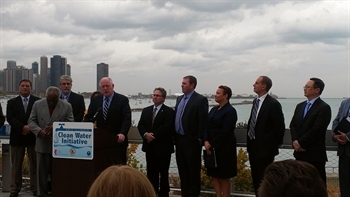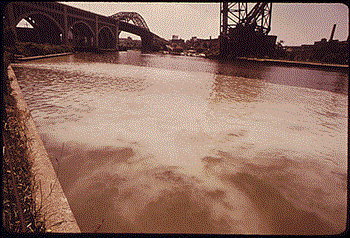
Abby Crisostomo
An abundance of fresh water on our doorstep doesn’t mean we can afford to stop investing in our water infrastructure.
Last Thursday marked the 40th anniversary of the Clean Water Act, and as I was standing out on the terrace of the Shedd Aquarium waiting for Illinois Gov. Patrick Quinn to arrive for a news conference, I couldn’t help but notice the view overlooking the vast expanse of Lake Michigan that dramatically underscored both the necessity for and beauty of clean, fresh water. What you couldn’t see from that view, however, was exactly what it takes to turn that water into the safe, reliable drinking water that comes out of our taps, or to transform dirty storm and wastewater into water clean enough to put back into local water bodies.
When you’re on your daily commute, does transportation spending ever cross your mind? My guess is that when you’re stuck in traffic, hit a pothole, or try to ride your bike on a street without dedicated lanes, you do wish for more investments in roads, rails, sidewalks, and trails. What about when you drink a glass of water or flush a toilet? How often do you think about the pipes that transport this water to and from your home, let alone their age? Maybe it’s because these pipes are hidden out of sight, out of mind, that we often don’t think about whether the infrastructure is in good condition until it’s too late. We’re able to talk about motor fuel taxes, tolling, value capture, and congestion pricing to help pay for transportation, but it’s very difficult to even bring up full-cost pricing for water or raising water or sewer rates.

Governor Quinn announced the state's new Clean Water Initiative on the 40th anniversary of the Clean Water Act.
Abby Crisostomo
At the news conference, Gov. Quinn, U.S. Environmental Protection Agency Administrator Lisa Jackson, representatives from the Ill. Environmental Protection Agency (IEPA), Ill. Dept. of Natural Resources, Ill. Finance Authority (IFA), and others presented Gov. Quinn’s new Clean Water Initiative. This new initiative makes available $1 billion in loan financing for water infrastructure improvements, creating an estimated 28,500 jobs throughout the state. This money will be made available through an expansion of the $300 million currently available annually in IEPA’s two state revolving loan funds (SRF), which provide low-interest loans to local governments and sanitary districts to improve drinking water and wastewater infrastructure to better comply with the Clean Water and Safe Drinking Water Acts. Amazingly, neither new state tax dollars nor any increase in general obligation debt will be used to fund this initiative. Instead, the IFA will leverage the outstanding SRF loan replayments, of which there have never been defaults, by issuing bonds to increase IEPA’s lending capacity.
This announcement comes right at the time that we at MPC are planning our work for 2013, and it fits right in with our goal to help metropolitan Chicago support community and regional economic growth, which we risk jeopardizing without smart policies and good planning. To ensure we’re managing our water assets in the most productive, responsible way, MPC helps community and regional decision makers develop sound plans and policies for water supply and stormwater management.
As with MPC’s other projects, our water supply and stormwater work focus on solutions at the scale of the problems, efficient governance, and the best use of existing infrastructure and resources, and we generally do this through policy research, advocacy, and implementation. As part of our policy research in 2013, we will release a white paper on our research on water loss accounting in Illinois, which seeks to encourage state policies that facilitate more efficient local water management and data-driven investment. As part of our advocacy work, we will continue to help the Ill. Dept. of Public Health modernize Illinois’ Plumbing Code to allow for cost-effective re-use of non-potable water. Our 2013 policy implementation will include continued collaboration with local communities on everything from integrated water resource planning, establishing desired level of service for water supply, and planning for and finding the most appropriate ways to encourage neighborhood-scale green infrastructure investments.

Federal water policy from the 1970s and the State Revolving Loan Funds they spurred helped clean heavily polluted bodies of water, like Cleveland’s Cuyahoga River, which caught fire several times due to pollution.
Photo courtesy of U.S. EPA Project Documerica/Circle of Blue
In our urbanized society, it takes a lot of infrastructure, from pumps to pipes to treatment facilities to equipment and chemicals and more, to turn natural water resources into consumable products for us to use. All too often, and especially for those of us living next to the Great Lakes, we forget that part, and assume that with seemingly abundant sources of water, we shouldn’t have to pay much or at all to use it. But that mentality doesn’t take into account the necessary infrastructure, which is very expensive both to build and to maintain. With the new Clean Water Initiative, as well as work many communities are doing to improve and maintain existing infrastructure, we are on our way to making the necessary investments for the next 40 years of clean water.
Want to learn more about the Clean Water Initiative and IEPA’s Ill. Green Infrastructure Grant Program? Come to our Nov. 27 roundtable on local stormwater solutions, which will include an IEPA representative as the keynote speaker. Register now!